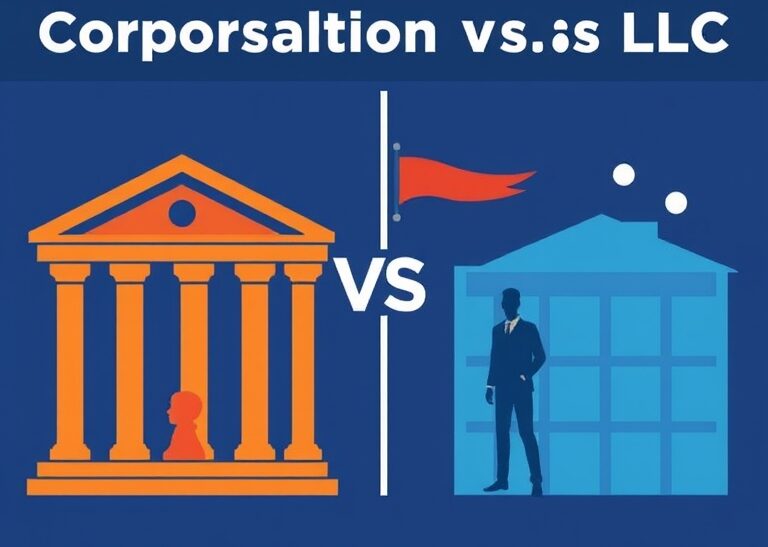When you’re starting a new business, one of the most important decisions you’ll face is choosing the right business structure. Two of the most common choices are a Corporation and a Limited Liability Company (LLC). Both offer certain benefits, but they also come with their own unique advantages and drawbacks. So, how do you decide which one is best for your business? In this article, we’ll break down the key differences between a Corporation vs LLC to help you make an informed choice.
Understanding the Basics: Corporation vs LLC
Before diving into the decision-making process, let’s first understand what each entity is and how they differ.
- Corporation: A corporation is a legal entity that is separate from its owners, known as shareholders. It offers the highest level of liability protection, which means that your personal assets are generally shielded from business debts and legal issues. Corporations can also raise capital by issuing stock.
- LLC (Limited Liability Company): An LLC combines the liability protection of a corporation with the operational flexibility of a partnership. It allows the owners, or members, to manage the business directly without the complex requirements of a corporation. LLCs are less formal than corporations and are often preferred by smaller businesses and startups.
Key Differences Between a Corporation and an LLC
To choose the right structure for your business, it’s crucial to compare the core features of a Corporation vs LLC:
1. Ownership and Management Structure
- Corporation: Corporations have a rigid structure. They must have a board of directors, officers, and shareholders. The board oversees the management of the company, while officers run day-to-day operations. Corporations also require annual shareholder meetings.
- LLC: An LLC is more flexible. It can be managed by its members (owners) or by appointed managers. There’s no requirement for a board of directors or formal meetings, making it easier to run.
2. Liability Protection
- Both a Corporation and an LLC provide liability protection, meaning your personal assets are protected from business debts and lawsuits. However, corporations generally offer more comprehensive protection in complex scenarios, while an LLC may provide adequate protection for smaller businesses or sole proprietors.
3. Taxation
- Corporation: Corporations are subject to double taxation—once at the corporate level and again when dividends are distributed to shareholders. However, S-corporations allow profits and losses to pass through to shareholders’ personal tax returns, avoiding double taxation.
- LLC: LLCs benefit from pass-through taxation, where profits and losses are reported on the owners’ personal tax returns. This avoids double taxation and is often more advantageous for smaller businesses.
4. Raising Capital
- Corporation: One of the biggest advantages of a corporation is its ability to raise capital. Corporations can issue stock to attract investors and expand their business.
- LLC: While LLCs can raise capital, they don’t have the ability to issue stock. This can limit funding options, making it more difficult to attract investors.
5. Compliance and Formalities
- Corporation: Corporations are subject to more stringent legal and regulatory requirements, including the need to hold annual meetings, maintain detailed records, and file annual reports.
- LLC: LLCs have fewer compliance requirements and are generally easier to maintain. They don’t require annual meetings or formal record-keeping as corporations do.
When to Choose a Corporation Over an LLC?
Choosing a corporation may be the right option if:
- You plan to raise significant capital through investors or venture capital.
- You want to offer stock options to employees.
- You anticipate needing a more formal structure for your business operations.
- Your business has the potential to scale rapidly and go public in the future.
- You prefer the corporate tax benefits that S-corp status can offer.
When to Choose an LLC Over a Corporation?
Opting for an LLC might be the better choice if:
- You want a simpler, more flexible business structure with fewer formalities.
- Your business is small or you don’t need to raise large amounts of capital.
- You prefer the pass-through taxation benefits that LLCs offer.
- You want more control over the daily operations of the business.
Conclusion: Corporation vs LLC
Ultimately, the choice between a Corporation vs LLC depends on your business’s goals, size, and financial needs. A corporation is better suited for larger businesses looking to raise capital and scale, while an LLC provides more flexibility, fewer formalities, and tax advantages, making it ideal for smaller businesses and entrepreneurs.
Whichever path you choose, it’s important to consult with legal or financial professionals to ensure you’re making the best decision for your unique situation. By understanding the key differences between these two structures, you can build a solid foundation for your business’s future.









